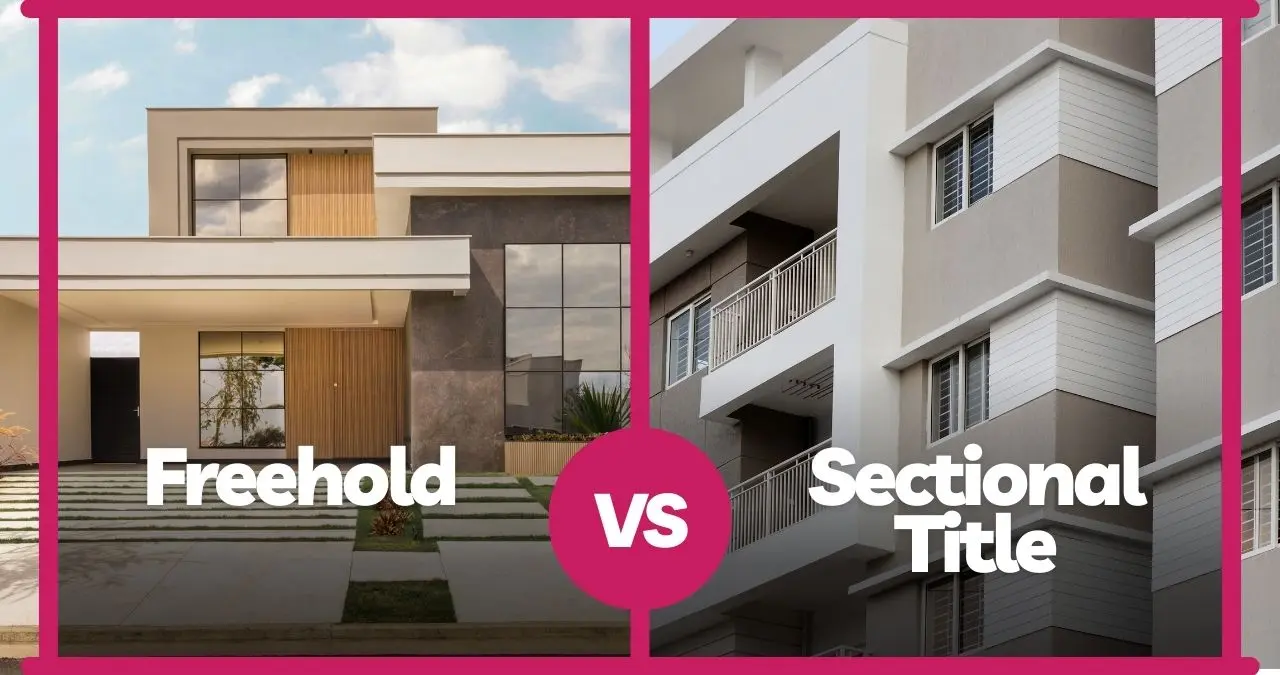When buying property in South Africa, one of the key decisions you’ll face is whether to opt for a freehold or a sectional title property. Each ownership type comes with unique benefits, responsibilities, and financial implications. To help you make an informed decision, let’s explore the differences, advantages, and considerations of freehold and sectional title properties.
What is Freehold Ownership?
Freehold ownership means you own both the property and the land it’s built on outright. You have complete control and are solely responsible for its maintenance, upgrades, and associated costs. Freehold properties are commonly found in standalone houses or estates.
Advantages of Freehold Ownership
- Full Autonomy: You have the freedom to modify your property as you wish, within municipal regulations.
- No Monthly Levies: Unlike sectional titles, there are no additional levies to pay.
- Higher Resale Value: Freehold properties often appreciate more over time due to their independence and lack of communal rules.
Considerations for Freehold Ownership
- Maintenance Costs: All upkeep, repairs, and maintenance are your sole responsibility.
- Security: Freehold homes may lack the shared security features of sectional title properties, requiring you to invest in your own measures.
- Costlier Insurance: Since you own the entire property, insuring both the structure and the land can be more expensive.
What is Sectional Title Ownership?
Sectional title ownership refers to owning a unit within a shared development, such as a townhouse complex or apartment block. You own your unit exclusively and share communal areas like gardens, pools, and parking spaces with other residents. A body corporate manages the complex.
Advantages of Sectional Title Ownership
- Shared Costs: Levies cover maintenance of communal areas, external repairs, and security, reducing personal expenses.
- Enhanced Security: Sectional title developments typically have perimeter security, access control, and other safety features.
- Community Living: Living in close proximity to others can foster a sense of community and shared responsibility.
Considerations for Sectional Title Ownership
- Monthly Levies: You’re required to pay levies, which can increase annually and strain your budget.
- Limited Autonomy: Changes to your unit often need approval from the body corporate, and you must adhere to the rules of the development.
- Potential Conflicts: Disputes with neighbours or the body corporate can arise over shared facilities or rules.
How to Choose Between Freehold and Sectional Title
The right choice depends on your lifestyle, financial situation, and long-term goals. Here are some factors to consider:
1. Your Budget
- Freehold properties might have higher upfront costs, but no levies.
- Sectional titles have lower entry costs but require monthly levies.
2. Maintenance and Responsibility
- If you prefer autonomy and don’t mind handling maintenance, a freehold is ideal.
- If you prefer shared responsibilities and minimal involvement in upkeep, sectional title is better suited.
3. Security Needs
- Sectional titles often provide comprehensive security, ideal for those prioritising safety.
- Freehold homes may require additional investment in private security measures.
4. Lifestyle Preferences
- Freehold properties suit those seeking privacy, space, and freedom.
- Sectional titles work well for those who value community living and low-maintenance lifestyles.
5. Investment Potential
- Freehold properties tend to appreciate faster but may be harder to sell in slower markets.
- Sectional titles offer affordability and steady rental demand, appealing to investors.
Common Scenarios for Choosing Each Option
- Freehold: Ideal for families, retirees, or those looking to customise their space.
- Sectional Title: Suitable for young professionals, first-time buyers, or those looking for lock-up-and-go convenience.
Frequently Asked Questions – Freehold vs Sectional Title
What are the advantages of freehold?
Freehold ownership gives you complete control over your property, including the land it’s built on. You’re free to make renovations or modifications (subject to local building regulations), and there are no shared responsibilities for maintenance. Additionally, freehold properties tend to offer better long-term investment potential due to land ownership.
Do you own the land in a sectional title?
No, in a sectional title scheme, you own your unit or section but share ownership of the communal areas, such as gardens, pools, and driveways, with other unit owners. The land and communal areas are managed collectively by the body corporate.
What are the disadvantages of freehold?
Freehold properties require the owner to handle all maintenance and repairs, which can be costly and time-consuming. Additionally, they often come with higher upfront costs compared to sectional titles, and you won’t have access to shared amenities such as pools or security services unless you invest in them yourself.
What are the disadvantages of a sectional title?
Sectional title ownership means you have less control over your property, as communal areas are managed by the body corporate, and decisions are made collectively. You’ll also need to pay monthly levies for the maintenance of shared spaces, and disputes with other owners can arise if management issues occur.
What is a freehold property in South Africa?
In South Africa, a freehold property is a standalone property where the owner has full ownership of both the building and the land on which it stands. It is not part of a shared scheme or community, giving the owner complete autonomy over the property.
Which is better: freehold or sectional title?
The choice depends on your needs and lifestyle. Freehold properties are ideal for those seeking independence and long-term investments, while sectional titles suit individuals who prefer shared amenities, lower maintenance responsibilities, and added security.
Are sectional title levies expensive?
Sectional title levies vary depending on the property and the amenities provided, such as security, maintenance, and shared facilities. It’s essential to review the levies before purchasing to ensure they align with your budget.
Can you get a mortgage for sectional title and freehold properties?
Yes, banks and financial institutions in South Africa offer home loans for both freehold and sectional title properties. However, they may assess factors such as levies (for sectional titles) and property value differently when determining loan amounts and terms.
What happens if I don’t pay sectional title levies?
Failure to pay levies can result in legal action from the body corporate. In extreme cases, this could lead to your property being sold to recover unpaid fees. It’s vital to stay on top of levy payments to avoid such scenarios.
How do I choose between freehold and sectional title?
Consider your lifestyle, financial capacity, and long-term goals. Freehold properties are better for those who want full autonomy and a potential long-term investment, while sectional titles are ideal for individuals who value convenience, shared amenities, and reduced maintenance responsibilities.
Conclusion
Choosing between freehold and sectional title ownership depends on your personal circumstances and preferences. Both offer unique benefits, and understanding these differences ensures you make a decision that aligns with your lifestyle and financial goals.
Disclaimer:
The content on this website is for informational purposes only and does not constitute financial, investment, or real estate advice. Readers are encouraged to consult a qualified financial advisor or a registered real estate agent for professional guidance tailored to their specific needs. Propertify is not liable for any actions taken based on the information provided here.







